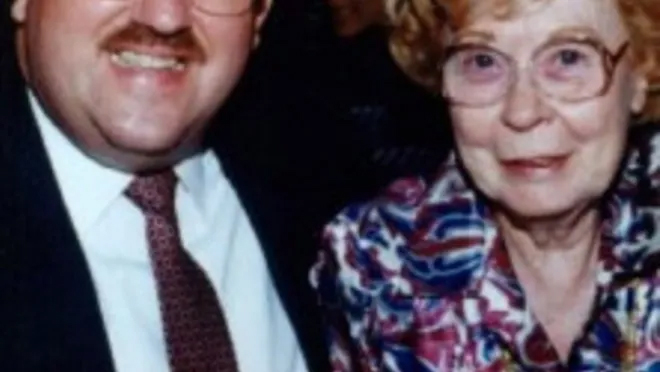Bernie Tiede Appeal Hinges on ‘New’ Abuse Claim
Chuck Lindell Published 12:01 a.m. CT June 29, 2014 | Updated 8:37 a.m. CT Sept. 25, 2018
Read it at statesman.com online!
Bernie Tiede has been out of prison and living in Austin since early May, but his continued freedom is by no means assured.
Memorably portrayed by actor Jack Black in the dark comedy “Bernie,” Tiede is awaiting word of his fate from the Court of Criminal Appeals, a nine-judge panel with a reputation for viewing inmate appeals with skepticism.
The court is reviewing two opposing documents as it works toward a decision.

Marjorie Nugent, an East Texas widow who was murdered by Bernie Tiede. The case was the subject of the Richard Linklater film "Bernie". Austin American-Statesman
The first, filed on Tiede’s behalf, argues that newly discovered sexual abuse in Tiede’s past contradicts evidence used to sentence him to life in prison for the 1996 shooting death of Marjorie Nugent, a rich widow he had befriended. Tiede is seeking a new punishment trial, which would probably result in a sentence of time served — 17 years in prison — and freedom.
The second is a legal brief from members of Nugent’s family, who argue that Tiede should be returned to prison to complete his sentence because the evidence of abuse is not new since it was known by Tiede when he was tried. Defendants cannot hide evidence, only to spring it later in a bid for a lighter sentence, they argue.
If the Nugents prevail, Tiede would not be eligible for parole until 2027.
Tiede, free on bail while the state’s highest criminal court considers his appeal, can be sent back to prison because his murder conviction is unaffected by the current legal tussle. So, if the appeals court declines to grant a new punishment trial, his life sentence would remain in force as well.
Much will hinge on how the court perceives Tiede’s abuse claim.
According to his appeal, he was the victim of a sexual predator, an uncle who abused him for six years starting when Tiede was about 12. The abuse stayed secret until it was recently puzzled out by a defense lawyer, and mental health experts who examined Tiede have filed affidavits saying the abuse had a devastating impact on his life and reduced his culpability for Nugent’s murder.
The experts, including Edward Gripon, a prominent psychiatrist hired by prosecutor Danny Buck Davidson, concluded that the abuse eroded Tiede’s ability to cope with repeated psychological abuse meted out by Nugent during their five-year friendship, during which Tiede quit his job as an assistant funeral director to become her business manager.
Davidson acknowledged that had he known about the abuse, he would have sought no more than a 20-year prison term for Tiede.
In the interest of justice, Davidson said, he agreed to defense lawyers’ request for a new punishment trial.
More important, Tiede’s appeal argued, Gripon has acknowledged that he unknowingly provided false testimony in 1999 when he told jurors that Tiede had no mental health problems that could explain why he suddenly shot Nugent, hid her body in a freezer and continued with life as if nothing was wrong until the body was discovered nine months later.
The false testimony during Tiede’s sentencing trial entitles him to a new, lighter sentence, his appeal said.
In a legal brief filed last week, Nugent’s family countered that Tiede cannot claim to have “newly discovered evidence” when he knew of the abuse at the time of his trial.
“There can be no question the evidence was available to Tiede — had he chosen to reveal it,” the Nugents argue.
Tiede also forfeited the right to claim that Gripon provided false testimony, they said.
“Tiede possessed the information necessary to prevent or correct this misinformation,” the Nugents said. “Tiede alone bears the responsibility for any misinformation conveyed to the jury. He cannot rely on his own concealment to establish a due process violation for sentencing based on false evidence.”
Tiede’s lawyers say their client should not be penalized for hiding his abuse.
“It is not unusual for victims of sexual child abuse to hide the events due to extreme guilt and shame. This denial of abuse usually continues well into adulthood, and is even more prevalent when the sexual abuse is male-to-male,” Tiede’s lawyers told the court.
But the Nugents’ brief said the reasons don’t matter.
“Perhaps Tiede failed to reveal the abuse to his lawyers or anyone else … for deep-seated psychological reasons. But even if all this is true, nothing in the law suggests that … reluctance to reveal childhood abuse supports a later claim for habeas corpus … based on ‘newly available evidence,’ ” they argued.
The appeals court has no deadline to issue its decision.